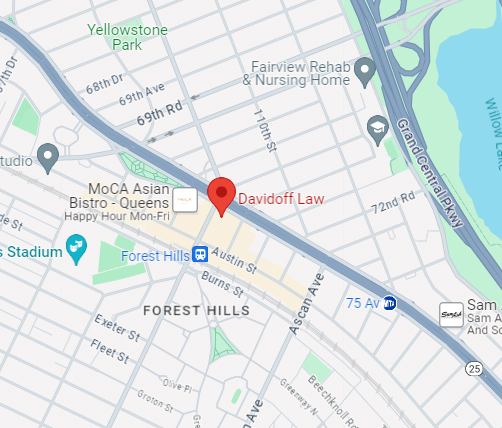Settling Child Support The Right Way
A parent’s obligation to help financially support their child does not end when the marriage does. After a divorce, you and your spouse will both be expected to help pay for your child’s needs and interests. If the divorce causes an income disparity, though, it could be difficult for one ex-spouse to keep up with those costs. This is where child support agreements become so important.
Table of Contents
Davidoff Law and our Queens child support lawyers would be happy to sit down with you to discuss the best way to create a child support agreement. From the beginning, we will focus on your child’s best interests because that is what a New York family law court or judge will do, too. We want to make sure that you and your ex-spouse will feel comfortable with the agreement while also fully supporting your child.
What Is Child Support In New York?
Child support is a payment from one spouse to the other to help cover the costs of care for their child or children. It is usually established in divorce, but it can be arranged for legal separations as well. What is important is that child support money must be used to pay for things that benefit the child, not something that the spouse wanted for their own benefit.
Child support payments are typically used to help pay for:
- Food
- Housing
- Clothing
- School expenses
- Medical costs
- Childcare
- Some forms of entertainment
- Day-to-day costs of raising a child
The court will usually expect the non-custodial parent to make payments to the custodial or primary custodial parent because they will spend more time with their child. This remains the case even when the custodial parent makes more income than the non-custodial parent. If the parenting time is split as evenly as possible, then the court will pay more attention to income disparities to decide on a fair child support agreement.
Furthermore, child support payments aren’t permanent. When the child reaches the age of 21 or becomes legally emancipated, New York law will end child support obligations.
How Child Support Is Calculated
Paying your spouse child support or receiving child support from your spouse is not as simple as picking a monthly amount that seems fair. In New York, both parents are expected to use the guidelines as set by the state’s Child Support Standards Act (CSSA). Using this guide, both parents’ incomes are added together, and the total is multiplied by the relevant child support percentage. The result is then proportioned according to the difference between each parent’s income.
The child support income percentages in New York are:
- One child: 17%
- Two children: 25%
- Three children: 29%
- Four children: 31%
- Five or more children: At least 35%
For example: Jack and Jill share one child, and they have decided to divorce. Jill makes $60,000 and Jack makes $40,000. The couple’s total income is $100,000. Multiplying this total by 17% is $17,000, which is how much the court expects the costs of raising that child each year will be.
When the combined income of both parents exceeds $148,000 per year, a slightly different formula can be used. This method applies to the first $148,000 of annual combined income and then makes case-specific exceptions and modifications for every dollar of combined income beyond that amount. Calculating child support can be complicated and math-heavy, even with the CSSA guideline in place, so you should always rely on the help of an attorney to figure it out.
Penalties For Failing To Pay Child Support
Make no mistake: A child support order is a court order. Failing to adhere to it is a bad idea that can bring heavy penalties to the spouse who is out of compliance.
If you don’t pay child support as ordered, then these penalties can be used against you:
- Paycheck garnishments
- Driver’s license suspension
- Professional license revocation
- Passport revocation
- Tax refund interception
- Bank account freezes
- Up to six months of jail
- And more
You must have a legitimate reason why you could not meet child support obligations to avoid penalties for not paying it. You are also expected to notify your spouse and the court if you believe that you will soon default on your child support obligations. As always, you should approach the situation with a professional child support lawyer on your side.
Get Answers To All Your Child Support Questions
Get our Queens child support attorneys on the phone today by calling (212) 900-0000. We are here to help you decide the best way to settle child support, so your child’s best interests and happiness are always preserved. If your spouse is causing trouble with child support or not paying it, then we can help you figure out that situation as well.



